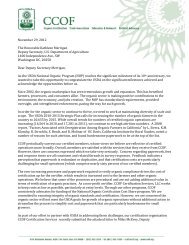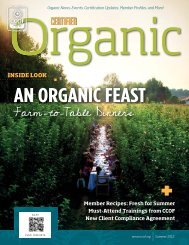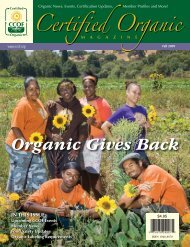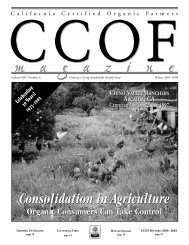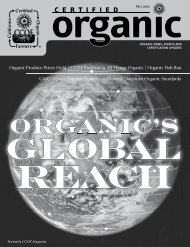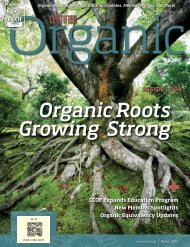Going Organic: Training New Growers - CCOF
Going Organic: Training New Growers - CCOF
Going Organic: Training New Growers - CCOF
Create successful ePaper yourself
Turn your PDF publications into a flip-book with our unique Google optimized e-Paper software.
ccof news<br />
continued from page 8<br />
Survey Explores Growth Trends in <strong>Organic</strong> Foods<br />
Recent consumer research of U.S. s hoppers performed by<br />
Whole Foods revealed that nearly two-thirds (65%) of Americans<br />
have tried organic foods and beverages, jumping from<br />
just over half (54%) in both 2003 and 2004. The market for<br />
organic foods continues to grow, with 27% of respondents<br />
indicating they consume more organic foods and beverages<br />
than they did one year ago. Ten percent consume organic<br />
foods several times per week, up from just seven percent last<br />
year. U.S. consumers are buying organic foods and beverages<br />
for a variety of reasons. The top three are: avoidance of pesticides,<br />
freshness, and health and nutrition. Fifty-five percent<br />
buy organic to avoid genetically modified foods. Fresh fruits<br />
and vegetables remain overwhelmingly the most frequently<br />
purchased category of organic foods at 73%. Produce is followed<br />
by non-dairy beverages (32%), bread or baked goods<br />
(32%), dairy items (24.6%), packaged goods such as soup or<br />
pasta (22.2%), meat (22.2%), snack foods (22.1%), frozen<br />
foods (16.6%), prepared and ready-to-eat meals (12.2%),<br />
and baby food (3.2%). As these trends continue, we hope to<br />
bring more shoppers to <strong>CCOF</strong>’s diverse client base at farmers’<br />
markets, natural food stores and supermarkets.<br />
Grilla Bites restaurants<br />
building an organic empire<br />
looking for cooks, managers,<br />
owners with the spirit.<br />
www.grillabites.com<br />
Presenting <strong>Organic</strong> Restaurants for the Masses at the<br />
Ecological Farming Conference January 26th, 10: 0 AM<br />
gmo news<br />
continued from page 9<br />
bussed in. Hawaiian Research, which employs about 140 employees,<br />
started on Molokai in 1968 and became a part of the<br />
Monsanto Company in 2000.<br />
Despite the walk out, Walter Ritte, spokesperson for the<br />
community group Hui Ho’opakele ‘Aina (Rescue the Land)<br />
that organized the demonstration said, “I think we got a lot<br />
of people asking, ‘What are GMOs?’ and ‘What are they doing<br />
in our fields?’” The group wanted to ask Monsanto if company<br />
representatives would agree to talk with the community<br />
about growing GMOs on Molokai. Ritte said Hawaiian<br />
Research’s activity threatens the community’s health, organic<br />
farming, and medicinal Hawaiian plants, such as the uhaoloa<br />
shrub, whose roots are used to treat congestion in children.<br />
Wildlife Refuge Used for Genetically Modified Crops<br />
The U.S. Fish & Wildlife Service has expanded a controversial<br />
program in which genetically modified (GM) soybeans<br />
and corn are grown by local farmers on Delaware’s Prime<br />
Hook National Wildlife Refuge. Public Employees for Environmental<br />
Responsibility (PEER) released a letter protesting<br />
the move as wreaking ecological havoc and violating the<br />
Service’s own policies.<br />
“Plowing under high-quality grasslands to plant soybeans<br />
does wildlife no good and sets a terrible precedent affecting<br />
the entire National Wildlife Refuge System,” stated Gene<br />
Hocutt, the head of PEER’s Refuge Keeper program and a<br />
former long-time refuge manager. “Prime Hook is supposed<br />
to be a National Wildlife Refuge – not a national soybean<br />
patch!”<br />
Five hundred of the Wildlife Refuge’s 10,000 acres are<br />
being used in the program. In 2001, the farmers switched to<br />
GM crops. At that same time, the Refuge took 150 acres out<br />
of the farming program to participate in a regional Grassland<br />
Bird study. The study found rare plants and insects as well<br />
as unique birding opportunities. Despite those findings, the<br />
Refuge now plans to put the 150 study acres back into GM<br />
cultivation.<br />
PEER is recruiting local conservationists and organizations<br />
to join a lawsuit to end the Prime Hook farming<br />
program.<br />
www.ccof.org<br />
Visit the <strong>CCOF</strong> website<br />
to learn more<br />
about certification,<br />
membership and organics.<br />
1 Certified <strong>Organic</strong> Winter 2006





